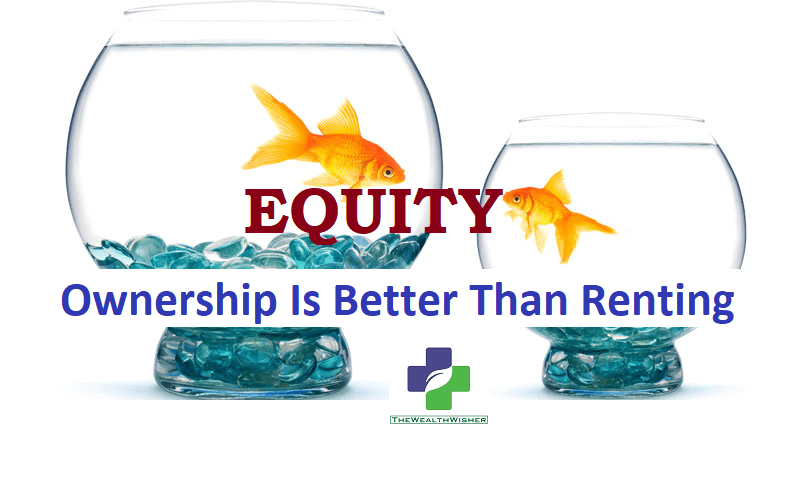One of my investors who own a sizable chunk of Mutual Funds, asked me – Madhu when are we going to invest in equity?
I answered, “we are already investing in 70-80% of markets through the MFs. So why do you think we are not investing in equity?”
He said, “Through MFs I get units. But when I buy shares it gives me a feeling of owning the company”.
Well, this is true. But in no way, I am saying that one should prefer equity over MFs, as it depends on risk tolerance and host of other factors to choose the assets.
But yes equity is ownership. Even the fund manager who buys on your behalf actually makes you the owner of companies. Investing in MFs also gives the owner’s growth. You can know the names of these companies by looking at the fact-sheet or portfolio disclosure.
How does this happen? Let’s understand that before knowing what is Equity or Shares or Stocks?
What is Equity Shares/Stocks?
A share/stock of a company represents a small stake in a company’s underlying business. In the past, many investors remained invested in a company for long periods aiming to participate in that company’s growth across business cycles and earn dividends along the way.
What is the ownership?
Ownership means you own the residual value of the company after the company pays it dues (interest obligations, bills, and taxes). Now, this is a complicated definition.
Does the residual word imply that I wait for liquidation to claim my share?
No, you can claim your share by selling your shares at a price. This price is the result of demand & supply of shares, created by fellow owners (sellers) and people who want to be owners (buyers).
So, when you hold a share you own the right to earn a dividend, demand information, see records, visit company premises or meetings, vote for or against any management decision, even sue the company & eventually sell whenever you want.
This is the ownership- the rights of being an owner.
So why investors do not feel owners?
This is because you don’t invest anymore, you TRADE shares.
Today the distinction between investors and traders is narrowing. Holding periods have reduced to a matter of days rather than years. This has contributed to share prices becoming more volatile.
The concept of “Renting” has gained prominence.
Facts:
- Many investors currently during the market high days are thinking of a date or a Friday when they will “sell all equity and cleanse all sins”.
- Hundreds of people buy shares in every IPO and sell even before allotment in the grey market.
- Many have stopped or about to stop SIPs, because market is too high for them.
- The average life of equity MF folio is just 18 months. So they prefer to exit at first instance.
- I have seen investor liquidating equity MFs before FDs, when they require funds.
So, when you are not looking for ownership the benefits will be limited.
You don’t own a parking lot in a mall. You just rent it for few hours. The value of the car does not appreciate or declines by your choice of a parking lot.
So, why people do not buy ownership?
The major reason is – Ignorance
They have never experienced the power of equity. No training or learning has been imparted on equity ownership. Investors have not seen long-term compounding. They have been made to believe that in long run we are all dead.
Other factors include:
- The advent of online trading and plummeting brokerage rates.
- Increased information flow, which facilitates quick decisions.
- Growing importance of the financial media, which is often biased & non-personal.
Enjoy the ownership by making money
However, for long-term investors willing to hold on for several years, volatility is a blessing in disguise as they can take advantage of sudden, unexplained plunges in stock prices to purchase stocks of good companies at attractive valuations.
One must always look for ownership directly or through mutual funds in companies which have:
- Low debt burden
- Strong franchises
- Relatively low earnings volatility
- Run by competent management who consider the interests of minority shareholders
Look at some examples:
Asian Paints

MRF Tyres

But is it so easy to buy Equity or Ownership?
No this is the most challenging thing. What when & how to pick equity is not common man’s job. One has to be expert before he buys equities.
Warren Buffet says – one has to evaluate the business on these parameters:
1.Is the business easy to understand?
2.Can it be purchased at a significant discount to its value?
3.Is the management rationale and candid with shareholders?
4.Has the company created at least one dollar of market value for every dollar invested ?.
However, while his approach to investing is simple, it is not always easy to implement. Not all have access to this information. So is there a second way out?
Can MFs be used to create ownership?
Yes, see these 2 examples how owning MF schemes have made wealth due to ownership of the asset.
Reliance Growth Fund

Franklin India Bluechip Fund

Investors may opt to invest through equity mutual fund schemes which invest according to the principles of value investing. The fund managers of many such schemes view their portfolio as a collection of businesses and not just stocks.
Also, many MF schemes will have very low portfolio turnover ratios, as the fund manager will prefer to hold on to the underlying companies as long as the business fundamentals are intact.
So what has been your experience in owning equity? Share with us in the comments section below. Also feel free to share the article so that others know you read good stuff!








